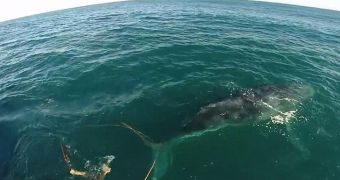Here is a piece of news that has high chances to put a smile on people's faces just in time for the weekend: a baby humpback whale has recently been rescued by a group of fishermen after getting caught in fishing gear.
Media reports say that the incident occurred in the waters off the coast of Geraldton, a city in Western Australia, and that the fishermen involved in it are from New Zealand.
Talking to the press, the men explained that, at the time they found the baby humpback whale, the marine mammal was entangled in cray pot lines and was desperately trying to free itself.
Unfortunately, the fishing gear was well tied around its tail, which means that, had it not been for the New Zealand fishermen, the young marine mammals would not have managed to shake off the cray pot lines.
Daily Mail informs that, after figuring out that the baby humpback whale was in dire need of help, the skipper decided to jump in the water with it and try and remove the fishing gear himself.
Despite their impressive size, humpback whales are not usually aggressive towards people. On the contrary, divers and wildlife researchers say that they feel quite at ease close to humans and do not shy away from interacting with them.
However, the baby marine mammals that the New Zealand fishermen helped free was already in distress at the time the skipper tried to approach it, which could have make the entire rescue operation a tad more difficult.
The good news is that, contrary to expectations, the young whale did not even try to put up a fight when Joe Brogan swam towards it. In fact, the people who witnessed the scene say that, almost as soon as the skipper got in the water, the marine mammal became a tad calmer.
Looking not to upset the whale, Joe Brogan cut the fishing gear without getting too close to the animal. Once freed, the humpback swam away from the fishermen and their boat. Check out the video below to see the marine mammal bid its rescuers farewell.
Marine mammals and fishing gear are not exactly the best of friends. This is not because whales and dolphins like to discriminate against floating objects that are simply not as cool as they are, but because lines and other equipment that fishermen use like to wrap themselves around the bodies of the animals they encounter.
Studies have shown that, when forced to drag fishing gear behind them, whales do not swim as fast or dive as deep as they otherwise would. Specialists say that, in time, the fishing gear affects the marine mammals' feeding behavior and can cause them to die a slow and painful death.

 14 DAY TRIAL //
14 DAY TRIAL // 